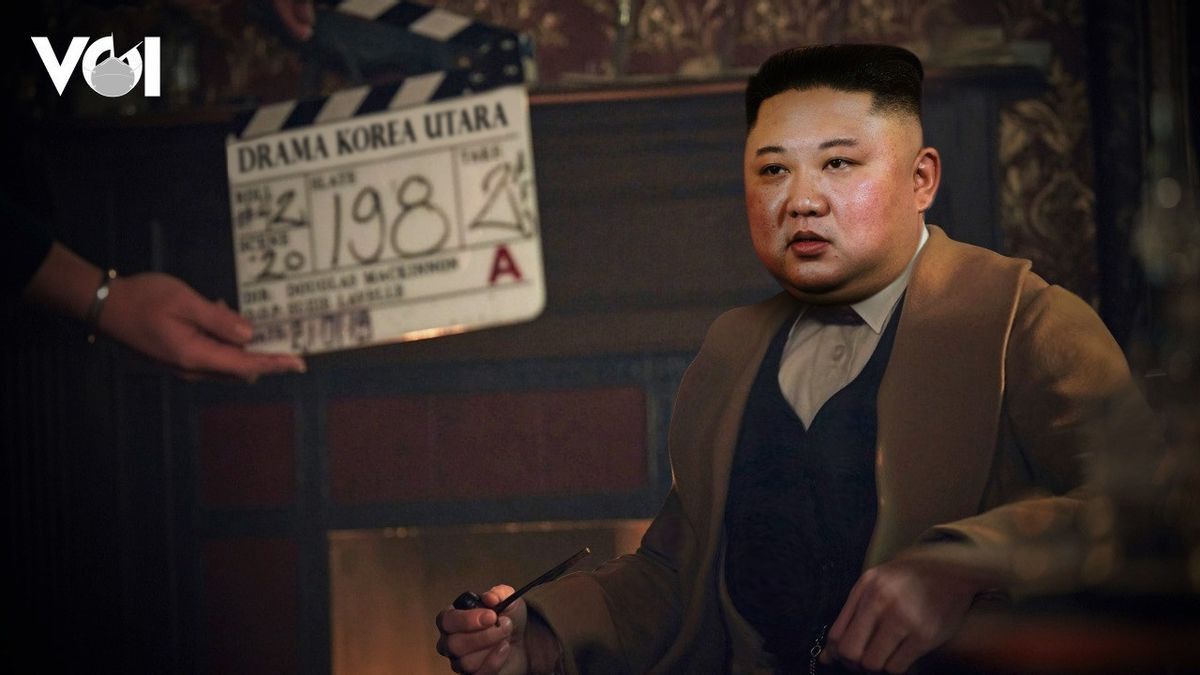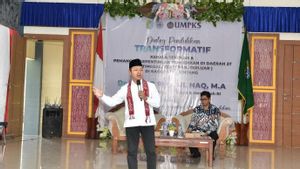JAKARTA - North Korea (North Korea) has imposed sanctions on a man who smuggled and sold copies of the Squid Game series. The anti-South Korean attitude towards audiovisual products made by South Korea and the West is not a veil. This reminds us of a series of records of the relationship between films, North Korea, South Korea and the West. And if you look at history, North Korea actually has a desire to make films in its own country, like many other countries in the world.
Previously, seven high school students were arrested by the authorities for watching the Squid Game. The series published by Netflix has broken the company's internal record as the most popular show.
According to Korea Boo, the man brought a copy of the Squid Game to North Korea when he returned from his trip to China. He then sold a flash drive containing the series. The smuggler is said to have to face off against a firing squad, which Korea Boo describes as having the fate of a Squid Game contestant who died at the end of a pink army rifle.
The flash drive fell into the hands of one of the seven students arrested by the police. The students were punished. There are also a number of people from the school who are considered negligent. Radio Free Asia (RFA), a US news media outlet that focuses on North Korean news, reports that the sentences imposed on each of them varied from forced labor to exile.
“A student who bought a drive received a life sentence. Meanwhile, six other viewers of the show were sentenced to five years of forced labor. Teachers and school administrators have been fired and are facing exile to work in remote mines or are self-isolating,” RFA reported.
North Korea anti-South Korean and WestNorth Korean society is clearly behind. The Squid Game is a phenomenon. This series by director Hwang Dong-Hyuk was widely praised and enjoyed. Squid Game raises the issue of social class and a reflection of the darkness of capitalism.
North Korea is basically anti-South Korean and Western films. Prior to the Squid Game case, as reported by Daily NK, in September eight teenagers were sentenced to life imprisonment for watching the South Korean series and films, The Spy Gone North and Crash Landing On You.
The Spy Gone North is about a South Korean spy who infiltrated North Korea in the 1990s. Meanwhile, Crash Landing On You tells the life of a South Korean woman trapped in North Korea due to a paragliding accident.
In June, North Korea also sentenced four teenagers to 10 to 12 years of forced labor for watching the South Korean series, The Penthouse. The case comes shortly after Kim Jong-un's government introduced a new law aimed at rooting out all kinds of foreign influence.

The law penalizes anyone caught watching a movie, dressing up, or communicating proficiently in foreign slang. An eleven-year-old North Korean named Yoon Mi-so is almost considered a traitor for watching a South Korean drama. He told the BBC he recounted the traumatic experience of witnessing the death of a man in the same case.
"I have a strong memory of the blindfolded man, I can still see his tears flowing. It was traumatic for me. The blindfold was completely wet with his tears. They put him on a pole and tied him up and shot him," he told the BBC.
The law is known as a 'modification' of a similar legal product that has been in effect since December 2020: the Law on the Eradication of Reactionary Thoughts and Culture. The law also forces public participation to report if they find people consuming South Korean and Western propaganda products.
The Interview's epic smuggling and North Korea's long grudgeOn the South Korean side, massive propaganda exposure is carried out in real actions. In 2015, South Korean activist Lee Min-bok sent thousands of DVDs of the film The Interview to North Korea via hot air balloons.
The shipment of copies of the US film, which parodies Kim Jong-un and North Korean life, was sent in four acts from January to April. The hot air balloon package contained not only DVDs but also several US dollars and leaflets containing critical messages for Kim Jong-un.
"I launched a thousand pieces and about a million leaflets near the western part of the border," Lee told CNN.
Lee is a North Korean defector. He shared his response while watching The Interview. Even though it's a parody and stars Seth Rogen and James Franco, The Interview doesn't make him laugh. For Lee, The Interview is even vulgar.
But he thinks that by releasing the film to North Korea, he hopes to open the eyes of North Koreans that Kim Jong-un is not God but an ordinary human being. North Korea's grudge against the spread of the film The Interview was not finished for a long time.

In February 2021, the United States (US) Department of Justice indicted three North Korean hackers. They are said to have conspired with the North Korean government to steal cryptocurrencies worth more than 1.3 billion US dollars. One of their goals is to reply to The Interview.
The three are said to be part of a North Korean military intelligence group known as the Reconnaissance General Bureau. The three hackers reportedly fled with serious evidence indicating they were part of a larger operation to funnel money secretly into the North Korean government.
North Korea is struggling financially due to sanctions. “Cryptocurrencies are completely changing the way sanctions are carried out and their effectiveness,” said Stephanie T. Kleine-Ahlbrandt, a researcher at a think tank called the Henry L. Stimson Center.
According to the US government, the three managed to steal at least 112 million US dollars, of which 11.8 million they got from an unnamed New York-based financial company. The hackers also targeted the entertainment industry in retaliation for Columbia Pictures' film The Interview.
North Korea was furious when The Interview was about to be launched. In 2014, a spokesman for the North's Foreign Ministry made a statement that the distribution of a film about the attempted assassination of Kim Jong-un was an act of war.
North Korea at that time did not specify the title of the film. But a few months after that, October to be exact, The Interview was released. The Interview has exactly the same storyline as the North Koreans intended. North Korea even then promised "merciless retaliation."
The spokesman, quoted by KCNA, said, "Making and releasing a film with a storyline intended to harass our supreme leadership is a blatant act of terrorism and war that will definitely not be tolerated."
Marijuana comedian duo Seth and James serve as hosts and producers of a talk show. Both were invited to North Korea to interview Kim Jong-un. But both were asked by the Central Intelligence Agency (CIA) to kill Kim Jong-un.
North Korea kidnaps South Korean director for national film passionNorth Korea actually also has a passion for modern films. Because of the great desire, North Korea was involved in the kidnapping of a South Korean director named Shin Sang-ok. Shin was kidnapped to help North Korea develop their film production.
As discussed in the WRITING SERIES article entitled North Korean Film Industry Built from Propaganda and Kidnapping of South Korean Directors, throughout the 2000s, North Korea regularly held a film festival titled Udine Far Easet Film Festival.
The festival was filled with screenings of North Korean films. Several titles were screened, including the 1987 film, A Broad Bellflower and Myself in the Distant Future (1997). Both films are propaganda for North Koreans to change their diet.
Another well-known drama from North Korea is titled Hong Kil Dong, made in 1986. This drama is similar to the story of Robin Hood. But the North Korean version. The main character is Hong, a nobleman who starts an attack on a greedy landowner and a rice hoarder.
But when a group of ninja from Japan invaded their country, Hong turned nationalist and teamed up with his enemies to fight the Japanese invasion. There are many other North Korean film titles that also invite the attention of many people.
For example, Ten Zan: The Ultimate Mission. This film is present in the futuristic action genre. Or The Flower Girl, a film written directly by the then leader of North Korea, Kim Jong-il. The most important work in North Korean film history is Pulgasari. This film is even touted as a blueprint for modern North Korean films. Pulgasari is often called the 'Godzilla' of North Korea.
Meanwhile, the first North Korean film was born in 1494, just one year after the Democratic People's Republic of Korea was founded. The title of the film is My Home Village, directed by Kang Hong-sik. The film tells of the despair of the poor Korean land and full of massive exploitation by the landlords until the end of the Japanese occupation (1910-1945).
Kim Jong-il's attention to film can be seen since his reign. Throughout his reign, Kim Jong-il ensured the North Korean film industry was not short on funds during the 1970-1980s. But lately he is not satisfied with the quality of films made by his people.
Because of his ambition, Kim Jong-il ordered the kidnapping of an international caliber director from South Korea, Shin Sang-ok in 1978. Shin's ex-wife, actress Choi Eun-hee was also kidnapped. During their captivity, they were ordered to film a regime order film.

The author of the book North Korean Cinema: A History (2012), Johannes Schonherr explains Shin is a director and producer who has made 74 films during his 52-year active period. Shin, said Schonherr, is an international director who has collaborated with filmmakers from many countries, such as the US, Hong Kong, Japan, including in his own country of birth, South Korea.
Shin's skills make it possible to make films with good entertainment and production value in North Korea. "Shin can take the ancient formulas of North Korean propaganda and turn it into a great film," Schonherr said.
It worked, indeed. Shin successfully changed the quality of North Korean cinema. North Korean films got better under him. One of Shin's popular films is Runaway, an action film that ends with a train explosion. In addition to Runaway, Pulgasari, a North Korean monster film--as previously described--is also Shin's work.
Despite being kidnapped in 1978, Shin only started film production from 1983 to 1986. In that short span of time, he directed seven films and oversaw the production of 13 others.
*Read other information about North Korea or read other interesting articles from Ramdan Febrian and Yudhistira Mahabharata.
Other BERNASThe English, Chinese, Japanese, Arabic, and French versions are automatically generated by the AI. So there may still be inaccuracies in translating, please always see Indonesian as our main language. (system supported by DigitalSiber.id)









